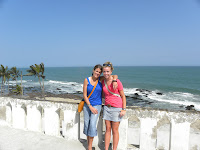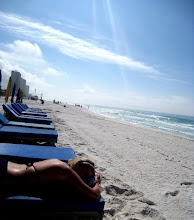
The disembarking of our voyage into Ghana was a historical moment for the nation. We were the largest group of Americans ever to come to their recently independent nation.
Ghanaians are obsessed with President Obama. There are billboards everywhere with his face next to their own President Mills. Obama recently visited Ghana and the hype is still prevalent. Besides the billboards, there are shirts, dresses, paintings, cloths, and even cookies with his face.
Ghanaians are obsessed with President Obama. There are billboards everywhere with his face next to their own President Mills. Obama recently visited Ghana and the hype is still prevalent. Besides the billboards, there are shirts, dresses, paintings, cloths, and even cookies with his face.
I gained a new perspective on clothing. Where do all of the surplus clothing donations go? They go here, to Ghana. They go to a vendor, a child, a businessman. I had a moment of self-realization when I saw a teenage boy walking towards me holding his little sister’s hand. He was wearing a light blue Lacoste polo. Albeit it was worn and torn and grimy. But here he was in rural Ghana wearing a shirt that was purchased for a meager price. He wore it out of necessity; he probably didn’t even pay heed to the color. But this is a shirt that I would personally shell out $90USD for and this boy did not give a care in the world to the fact that there was a small alligator stitched onto it. I want to try to remember this as I pick out new clothes. What do I really need?
A river stopped by the amount of garbage in it, failing construction, children wandering naked in the streets of a market, a emaciated man selling three fish on a string, a dog picking through discarded fish, public urination, the lack of decently lit or even roads, a roof made of palm leaves thousands of images that one would see in a movie or magazine fill my mind and the only file they can be stored in is Poverty. Having experienced the culture, the people, the traditions, I have a deeper understanding of their way of life. So although these images are those of poverty, I will forever carry with me the stories, the happiness and laughter, the pride, and the hope that this nation holds.
A river stopped by the amount of garbage in it, failing construction, children wandering naked in the streets of a market, a emaciated man selling three fish on a string, a dog picking through discarded fish, public urination, the lack of decently lit or even roads, a roof made of palm leaves thousands of images that one would see in a movie or magazine fill my mind and the only file they can be stored in is Poverty. Having experienced the culture, the people, the traditions, I have a deeper understanding of their way of life. So although these images are those of poverty, I will forever carry with me the stories, the happiness and laughter, the pride, and the hope that this nation holds.














